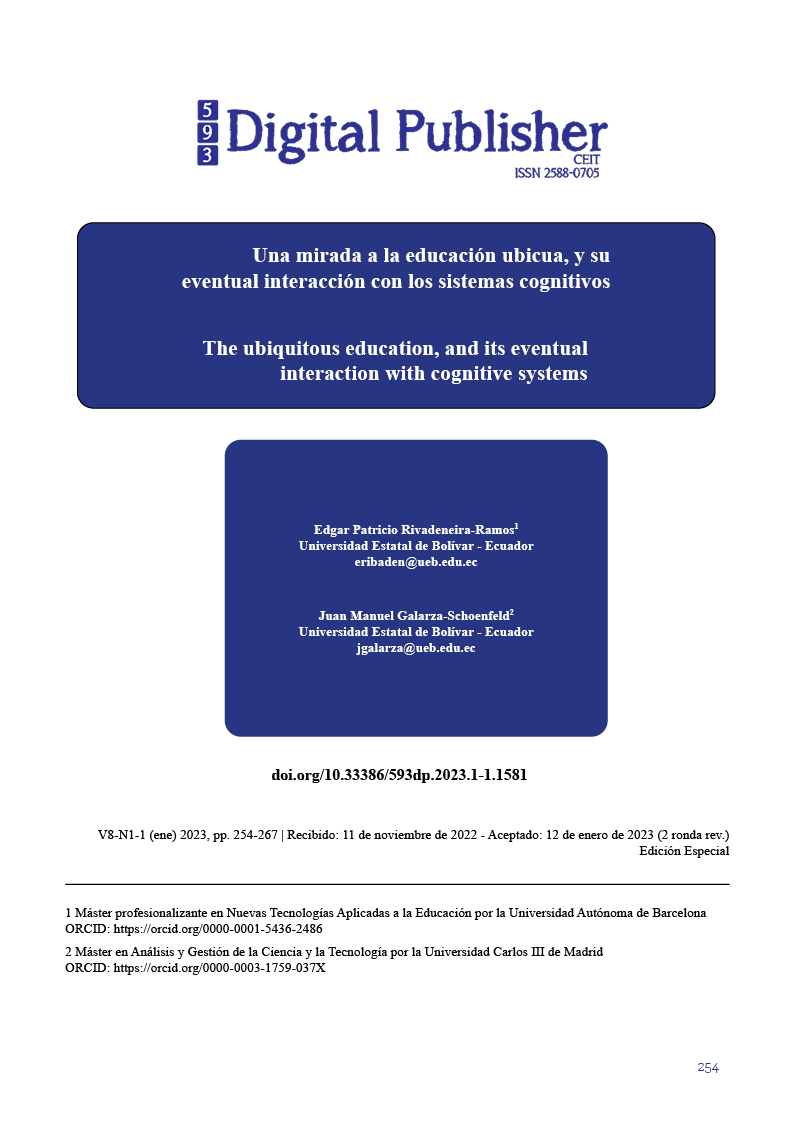The ubiquitous education, and its eventual interaction with cognitive systems
Main Article Content
Abstract
This approach has turned its gaze to the need to find a new possible scenario of what ubiquitous education is, making it part of that model to integrate cognitive systems, to orient an environment much more adjusted to the needs of the beneficiaries (students and teachers).
It begins by analyzing the effect of the COVID-19 pandemic on the academic system, while considering the true fact that technology has been present in this area for a long time, but the conditions presented since the first quarter of 2020, has made this a topic of increasing relevance.
The problem is summarized in the conflict that university students have, in terms of carrying out academic proceedings in an online environment, as they do not have a technological model that provides them with skills for the development of activities taking into account their existing needs. also considering the autonomy of choice of time and place to meet their responsibilities in a much more efficient and effective way for the system. From there follows the developed documentary review and the approach of an approach of solution, possibly viable.
Downloads
Article Details

This work is licensed under a Creative Commons Attribution-NonCommercial-ShareAlike 4.0 International License.
1. Derechos de autor
Las obras que se publican en 593 Digital Publisher CEIT están sujetas a los siguientes términos:
1.1. 593 Digital Publisher CEIT, conserva los derechos patrimoniales (copyright) de las obras publicadas, favorece y permite la reutilización de las mismas bajo la licencia Licencia Creative Commons 4.0 de Reconocimiento-NoComercial-CompartirIgual 4.0, por lo cual se pueden copiar, usar, difundir, transmitir y exponer públicamente, siempre que:
1.1.a. Se cite la autoría y fuente original de su publicación (revista, editorial, URL).
1.1.b. No se usen para fines comerciales u onerosos.
1.1.c. Se mencione la existencia y especificaciones de esta licencia de uso.
References
Báez, C., & Beufond, C. (2019). A Review of Ubiquitous Learning. Revista Iberoamericana de Educación a Distancia 22:325–44.
Conejo de Educación Superior. (2019). Reglamento del Régimen Académico CES. El Consejo de Educación Superior (111):78.
Chávez, M., Rivera, V., & Haro, G. (2021). Percepción de la educación virtual en instituciones de Educación Superior 2020 - 2020. Revista de Investigación Enlace Universitario 20(1):8–21. doi:10.33789/enlace.20.1.81.
Coto M., Collazos C., & Mora S. (2016). Collaborative and Ubiquitous Model to Support Teaching and Learning Processes in Iberoamerica. Revista de Educación a Distancia (RED) (48). doi:10.6018/red/48/10.
Costa, R., Souza, G., Valentim, M., & Castro, B. (2020). The theory of learning styles applied to distance learning. Cognitive Systems Research 64:134–45. doi: 10.1016/j.cogsys.2020.08.004.
Filippi, J., Lafuente, G., Ballesteros, C., Pérez, D., & Aguirre. S. (2013). “Tecnología de Cómputo Ubicua Aplicada a La Educación.” XV Workshop de Investigadores En Ciencias de La Computación 1046–50.
Hidalgo, C., Byron G. (2018). Data Mining in Learning Management Systems in University Education. Campus Virtuales 7(2):115–28.
Instituto Nacional de Estadísticas y Censos. (2021). Tecnologías de La Información y Comunicación, 2020 Contenido. INEC. 2021. Indicadores de Tecnología de La Información y Comunicación.
Lagos, G. (2018). El M- Learning, un nuevo escenario en la educación superior del Ecuador. INNOVA Research Journal 3(10.1):114–22. doi:10.33890/innova.v3.n10.1.2018.859.
Marioni, G., Hilliage, L., &. Trine, J. (2020). The impact of Covid-19 on higher education around the World.
Medina, R., & Gamboa, R. (2015). Usability evaluation by experts of a learning management system. Revista Iberoamericana de Tecnologías Del Aprendizaje 10(4):197–203. doi: 10.1109/RITA.2015.2486298.
Moreno, G. (2020). Modelo de U - Learning Basado En Plataformas de TV Everywhere.
Mosquera, R. (Julio de 2020). Universidad Tecnológica Empresarial de Guayaquil. Obtenido de La brecha digital: su impacto en la educación en línea: https://www.uteg.edu.ec/la-brecha-digital-su-impacto-en-la-educacion-en-line
Novoa, C., Félix, P., Cancino, R., Hernández, Y., Garro, L., & Méndez, G. (2020). Ubiquitous learning in the teaching-learning process. Revista Multi-Ensayos 2–8. doi: 10.5377/multiensayos.v0i0.9331.
Rivadeneira, E. (2021). Computación ubicua al servicio de la educación. Ciencia Latina Revista Científica Multidisciplinar, 5(6), 10793-10803. doi: 10.37811/cl_rcm.v5i6.1123
Rivero, C., & Suarez, C. (2017). Mobile Learning y el aprendizaje de las Matemáticas: El caso del proyecto MATI-TEC En El Perú. Tendencias Pedagógicas 30:37–52.
Royo, M., Ochoa, D., & Barajas, A. (2018). Tendencias En Computación: Web Semántica y Computación Cognitiva. XII:19–26.
Joung-Souk, S. (2009). U-Learning model design based on ubiquitous environment. International Journal of Advanced Science and Technology 13:77–88.
UNESCO. (Julio de 2020). Education: From disruption to recovery. Obtenido de https://en.unesco.org/covid19/educationresponse#schoolclosures
Universidad Técnica particular de Loja. (Octubre de 2020). 4 claves para entender la evolución de la Educación a Distancia en el país. Obtenido de https://noticias.utpl.edu.ec/4-claves-para-entender-la-evolucion-de-la-educacion-a-distancia-en-el-pais
Toro, C., Ortiz, H., Calle, A., & Jiménez, N. (2012). Los Sistemas Cognitivos Artificiales En La Enseñanza de La Matemática 1. Educación y Educadores 15(2):167–83. WEISER, M. (1999). The Computer for 21st Century. Pervasive Computing 1:19–25.
Zapata, M. (2015). Theories and models about learning in connected and ubiquitous environments. Teoría de La Educación; Educación y Cultura 16.



